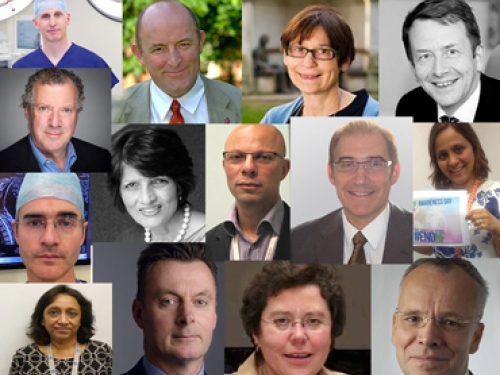Research: Progression through learning, understanding and new approaches
Introduction
Nerve Tumours UK works with many medical professionals, partner patient organisations, universities and accredited individuals to understand and gain insights into various aspects of how NF and its associated medical complications impacts on the daily life of those diagnosed with NF, the group name for Neurofibromatosis Type 1 (NF1), NF2-related-Schwannomatosis (NF2) and Schwannomatosis (SWN).
The results from these research projects, much of which is based on findings from within the community, are shared with medical professionals as well as our own Specialist NF Nurse Network, to further help and support those living with the condition. They also allow us the opportunity to improve the information for carers, educational bodies and employers as well as all associated medical professionals.
Results of completed research projects and studies will be shared via the website, when available for publication.
Detailed below, is a list of the latest research projects, that many members of our community are taking part in.
Nerve Tumours UK is not responsible for any data collection or the content of any of these projects. All requests to collaborate with research projects must receive prior approval of the Nerve Tumours UK Medical Advisory Board.
-
Study on improving support for ethnic and culturally diverse groups affected by visible difference
-
NF1 Diet & Fatigue Study
-
NF2 Quality of Life Questionnaire
-
NF1 cutaneous neurofibroma consortium project
-
Care Quality Commission survey
-
CAR research family planning decision making
-
Eden P for healthcare professionals
-
CAR Research Exploring family planning decisions
-
CAR Research visible difference experiences during recruitment
-
NF1 Non Invasive Brain Stimulation
-
CAR Parenting Toolkit
-
Healthcare experiences of individuals with NF1
-
Understand the experience of adults living with Neurofibromatosis Type I with Plexiform Neurofibromas (NF1 PN)
-
Eden-P Study
-
NF2 and Radiotherapy
-
Living with NF1: psychological impact & experiences
-
Mindful Parenting Study
-
Centre for Appearance Research NF1 support survey
-
Centre for Appearance Research Relationships study
-
Medical photography of dermatological conditions
-
Disfigurement equality at work research
-
NF1 stem cell research
-
NF1 Research Study with fly model
-
Childhood Neurological Conditions Survey Part 2
-
Online Harvard Study - Resilient Youth with NF
-
Eden Study
-
Centre for Appearance Research - Parents Support Materials Study
-
TABI (Teen Appearance and Body Image) - CAR Research Study
-
Centre for Appearance Research (CAR) - Somali Heritage & NF Study
-
NF2 & Identity Research Study
-
NF1 PN Impact on Patients’ and Caregivers’ Lives
-
Coordinated Care of Rare Diseases Study at UCL
-
Centre for Appearance Research NF Survey
-
Research call: Does neurofibromatosis affect how you feel about your body?
-
Repurposing anti-retroviral drugs to treat NF2 related tumours
-
NF1 with Plexiform Neurofibromas Study: information for patients and carers
-
Living with Neurofibromatosis Type 1: An Anthropological Study
-
Childhood Neurological Conditions Survey
-
Embracing Complexity: Share your Covid-19 Story
-
Act it Out Prototype App Trial
-
Covid-19 Impact on Wellbeing in Families of Children with Rare Neurogenetic Disorders(CoIN Study)
-
NF1, Plexiform Neurofibromas Market Research Study
-
Visible Difference Equality Law Research: summary of findings
-
Shaping the Future of Public and Patient Engagement in KHP Neurosciences
This study was produced by Dr Nicola Stock, Associate Professor of Psychology at the Centre for Appearance Research, with contributions from Appearance Collective charities, and funding from the VTCT Foundation.
Advancing psychological support for ethnic and culturally diverse groups affected by visible difference: Identifying barriers and opportunities in collaboration with the Appearance Collective charities
Ethnicity and culture can affect how individuals and families experience visible difference and interact with healthcare and support. Yet, ethnic and culturally diverse communities are perpetually underserved by existing services. The aim of this project was to identify opportunities and barriers to advancing psychological support in the charitable sector for ethnic and culturally diverse groups affected by visible difference in the UK.
Individual 1-1 interviews were conducted with representatives of the Appearance Collective charities to gain a comprehensive understanding of current UK charitable service provision for this population; and a broad, narrative review of current research and policy guidelines from the wider field examined known barriers, interventions and solutions for engaging ethnic and culturally diverse communities.
You can watch Dr Nicola Stock's Tedx Talk on appearance diversity below.
Many children and young people diagnosed with NF1 continuously feel tired, and so the team at St Mary's in Manchester headed by Dr. Grace Vassallo, have joined forces with Victoria Whiteley, Advanced Clinical Practitioner in Ketogenic Therapies at Royal Manchester Children's Hospital, to research whether diet and nutrition is linked to fatigue.
It will only take seconds to join up, but your help with this research will potentially lead to an improved quality of life for children, and ultimately adults, diagnosed with NF1.
If you are 15 and over and live with symptoms of NF2 your experiences may be invaluable. The Massachusetts General Hospital NF research team would like your help in testing a brand new quality of life questionnaire that will inform clinical trials around the world in making drug development for NF2 more focused on patients.
This study involves completing an online survey that may take up to 20 minutes to complete. You would receive a gift card (equivalent to $20 U.S. dollars but you can select to receive it in your local currency) as a thank you for your time.
RETREAT STUDY
Repurposing anti-retroviral drugs to treat NF2 related tumours
NF2 Research Needs you!
- If you have NF2 - NF2 related schwannamatosis
- Are over 18
- Have x2 or more skin lesions
You could be eligble to join the RETREAT research Trial
Curently recruiting throughout the UK! with research centers in both North and South (Plymouth and Manchester)
You are invited to take part in a research study being undertaken initially in Plymouth and Manchester, led by Professor C. Oliver Hanemann, a consultant neurologist at the Peninsula Medical School in Plymouth.
Although needed, there is currently no drug treatment for tumours in patients with NF2. Oliver Hanemann’s research group has identified two new candidate drugs.
In this small study, skin nerve tumour biopsies and blood samples from up to 16 participants, taken before and after treatment, will be analysed. This will quickly indicate whether the drug candidates should be tested in larger trials. Although there is no immediate benefit from taking part in the study, the results of the study may help NF2 patients in the future.
If you would like to find out more about the study, please contact Professor Hanemann. His contact details are:
Professor C. Oliver Hanemann MD FRCP
Email: Oliver.Hanemann@plymouth.ac.uk
or
Dr Sarah Kingdon
Email: sarah.kingdon@nhs.net
University Hospitals Plymouth NHS Trust
Tel: 01752 433714
Do you have NF1 and wish there were better treatments for neurofibromas?
Currently, there is no way to predict how many neurofibromas a person with NF1 will develop, and no drug treatments are available. This uncertainty can understandably cause distress.
This research aims to identify the genes that influence neurofibroma development, with the goal of discovering treatments that could prevent or reduce their growth.
The Care Quality Commission is looking to hear from people from ethnic minority backgrounds about their experiences of care and treatment for long-term physical health conditions, in both primary and secondary care.
They are looking to hear from people who are:
- from an ethnic minority background,
- have a long-term physical health condition,
- and live in either Croydon, Richmond, Kingston, Sutton, Merton or Wandsworth.
Kerry Montgomery, is a Research Fellow at the Centre for Appearance Research at the University of the West of England.
She is conducting research exploring family planning and decision making for people with a visible difference which can be inherited. She is looking for people who have an inheritable condition who have considered having children, or have had children in the last five years.
The Eden P study is looking for healthcare professionals, who provide support to expectant parents with NF1 during pregnancy.
We hope that this study will help us to better understand this service-providing process and to develop new support systems and interventions to improve the experiences of expectant parents with NF1 and health professionals/charity workers.
This research is now closed
Research Advisors required to take part in this CAR Research, which explores family planning decisions by people with a visible difference which can be inherited (eg Neurofibromatosis). The study will explore what influences decisions about having children and also what support would be helpful when making these decisions. Dr Kerry Montgomery is a Research Fellow at the Centre for Appearance Research at the University of the West of England. She is putting together a team of Research Advisors to help shape this research and make it as meaningful and helpful as possible.
Research participants are needed for a study on the impact of visible facial differences in candidate experience within the recruitment process.
The research will comprise of a 45-60 minute interview, via Microsoft Teams, to share their experiences during recruitment elements such as in-person interviews, online application forms etc. and how these processes may have affected individuals’ thoughts and feelings.
Many young people with NF1 have daily problems with learning, paying attention in the classroom and general concentration. At the University of Manchester, we are starting a new study to try understand how a particular treatment called ‘transcranial current stimulation’ (tCS) works to help children learn better. If you’re a young person (11-17) who suffers from learning difficulties and concentration problems, Manchester University wants to hear from you.
Alice is studying Genetic and Genomic Counselling MSc at Cardiff University.
Her final year dissertation will be researching the healthcare experiences of individuals with Neurofibromatosis Type 1. Participants should be aged 18 or over, and received a diagnosis of NF1 during childhood.
This research is now closed.
Researchers at the Centre for Appearance Research have created a support resource for parents of children with appearance-affecting conditions, such as NF. The Parenting Toolkit is based on research and aims to guide parents to manage challenges related to supporting their child.
CAR are undertaking a research evaluation to find out how effective ‘The Parenting Toolkit’ is at supporting parents of children with NF (Neurofibromatosis Type 1, NF2-related Schwannomatosis and Schwannomatosis)
This research is now closed
Sequentis health is conducting research on behalf of a pharmaceutical company to understand the experiences of adults living with Neurofibromatosis Type 1 (NF1) with Plexiform Neurofibroma (PN).
They are particularly looking for adult patients (18-40 years of age).
The aim of this research is to understand the reality of the NF1 PN journey from diagnosis to daily life for adults, and the emotional impact that has. We would also like to understand the care an individual patient receives (e.g., from Doctors) and how, if at all, this affects their experience with the condition.
This research is open for participation.
Participants required for new research study for pregnant women who have a family history of Neurofibromatosis type 1
Some children with Neurofibromatosis type 1 (NF1) experience daily problems with learning, paying attention in the classroom and concentrating. We don’t understand how these difficulties develop and don’t yet have good treatments for them.
At the University of Manchester, we are starting a new study to try to understand pregnancy experiences and early brain development of babies born to parents who have NF1 (either mother or father has NF1).
This research is open for participation.
Do you have NF2? Would you like to help research side-effects of radiotherapy?
Because NF2 is rare, it is difficult to study the risk of serious side effects of radiotherapy in people with NF2. Very few studies have been done.
Chay is organising a detailed study of the risk that radiotherapy could carry more complications in people with NF2 than in the general population, and develop useful prediction software for medical imaging. This research is at a very early stage. To make sure his proposal is relevant and benefits people as rapidly as possible, he is organising group discussions and consultations with the community.
This research is now closed
OPEN Health are conducting research to understand the experiences of people living with Neurofibromatosis Type I (NF-1) as well as their caregivers and their healthcare teams. If you or one of your loved ones or patients has NF1, we would like to hear from you.
They are particularly looking for young people with NF1, aged 7-16 years.
The aim of this research is to understand the reality of the NF1 journey from diagnosis to daily life, and the emotional impact that has. We would also like to get an accurate view of the effect that different forms of NF1 can have on someone’s experience with the condition.
This research is now closed
Are you a parent or carer of a child who is aged 4-16 years and living with a visible difference?
Abigail Clifton is a Trainee Clinical Psychologist at Cardiff University, and is conducting a six-week online Mindful Parenting programme, designed to reduce stress and enhance wellbeing.
Parents or carers, of a child aged 4-16 years living with a visible difference, are invited to take part. Specifically, they are looking for parents or carers who are experiencing some stress, worry or concern around their child’s visible difference.
They hope to learn whether the programme is helpful for parents or carers of children living with a visible difference, and whether completing the online programme is possible and practical within the timeframe.
This research is now closed.
Nerve Tumours UK, as part of the Appearance Collective, is supporting the online survey on what support is needed for those affected by NF1.
CAR has launched a short online survey to gather information on the support needs and preferences of people affected by an appearance-altering condition or injury (visible difference) of any sort.
This research is now closed.
Researchers at the Centre for Appearance Research have developed support materials for adults with appearance-affecting conditions, focussed specifically on intimacy and romantic relationships.
They are now looking for individuals with an appearance-affecting condition, like Neurofibromatosis, to review and provide feedback on these support materials.
This research is now closed.
Nicholas is a 4th Year Medical Student at Cardiff University, and with his supervisor Dr Jui Vyas, he is currently working on a project titled “Medical Photographs: Patient perceptions of medical photography of dermatological conditions”.
This pilot study is an attempt to understand some of the patient factors behind the reasons for inadequate representation of patients of skin of colour in dermatology images. In addition we would also like to determine if there are any other factors that influence a patient’s consent to medical photographs of their dermatological conditions. Therefore, the aim of the study is to determine if patient demographics influence perception of medical photography of dermatological conditions.
These questions will be asked to find out if these different factors influence patients’ perceptions on consenting for medical photographs being taken of their dermatological conditions, or if it influences whether health care professionals will request consent from patients.
Please note that the deadline to complete the survey is Sunday 19th June 2022.
This research is open for participation.
Queen Mary University, London are looking for HR/ EDI participants for their research on improving workplace equality for people with disfigurements in the UK.
We want to find out how employers approach issues related to disfigurement in the workplace and to identify factors which may either help or hinder workplace equality for people with disfigurements.
The findings will be used to construct guidance for employers on how to create appearance-inclusive workplaces, and to ensure that staff with disfigurements are not disadvantaged. We are looking for participants to contribute to this aspect of the study. The research outcomes will, we hope, be useful to employers in the future.
This research is open for participation.
Children with NF1 are more likely than others to have difficulties related to autism spectrum disorder but we don’t know why.
My research, as a PhD student at the University of Manchester, is hoping to uncover some hidden clues as to what may be happening during human brain development in NF1.
This research is open for participation.
Persons with NF1 are much more likely than others to be diagnosed with autism, which can often significantly impact an individual’s quality of life. However, we don’t understand why spelling mistakes in NF1 cause autism. Understanding this is really important to help us develop new treatments.
My research as a PhD student at the University of Manchester, under the supervision of Professor Richard Baines, Dr. Shruti Garg, and Professor Gareth Evans, aims to investigate how the NF1 gene is involved in controlling brain function. To do so, I use quite an unusual animal: the fruit fly.
This research is open for participation.
The British Paediatric Neurology Association and James Lind Alliance have launched a survey to define the Top 10 unanswered questions about the treatment of childhood neurological conditions, where there is uncertainty about the effectiveness of treatments.
We have refined those questions and are now launching our second survey. From a list of 44 questions, please choose the top 10 most important to you.
We would like to invite you to help us ensure that the survey and workshops we carry out following the outcomes involve those whose lives are affected by these conditions and the clinicians who treat them. Your previous support was invaluable.
This research is open for participation.
Online Harvard Study - Resilient Youth with NF
Our team at Massachusetts General Hospital is recruiting adolescents (ages 12-17) for a stress and symptom management program. This entirely virtual program consists of eight 45-minute group sessions over Zoom and online surveys.
If you are interested or would like more information, please contact jrbrewer@mgh.harvard.edu for more details. Julie Brewer, Study Co-ordinator
This research is open for participation.
Early Development in Neurofibromatosis type 1 (NF1)
The EDEN study aims to investigate early social, communication and attention development in babies who have NF1 or are born in a family where a parent has NF1.
About the study
EDEN is designed to identify early markers of learning and behavioural difficulties such as autism and ADHD by understanding social and cognitive development of babies with NF1. All babies born in a family with a history of NF1 are welcome to participate. We will compare the development of babies who have NF1 to those babies who do not inherit NF1.
By understanding early development, our aim is to speed up the discovery of treatments that can be used to boost learning and social development in NF1.
The study is a collaboration with Birkbeck, University of London and BASIS, The University of Manchester and Central Manchester University Hospitals NHS Foundation Trust.
The EDEN study is funded by Action Medical Research for Children, Great Ormond Street Hospital Charity and Medical Research Council.
This research is now closed.
Maia Thornton, a PhD student from the Centre for Appearance Research, is looking for parents and carers of children aged 0-18 years to provide feedback on some parent materials.
These parent support materials have been designed with parents of children with appearance affecting conditions and injuries, and professionals who have experience supporting these families.
Parents and carers will be asked to review support materials and answer a short survey to tell us about their experience, and anything they feel could be improved.
Anyone who completes the survey will be offered the chance to enter into a raffle to win a £50 Amazon voucher.
Email Maia at maia.thornton@uwe.ac.uk for more information.
This research is now closed.
Young people often have concerns about the way they look. This can sometimes affect a range of things, such as their self-perceptions, their relationships with others, and how they do at school. The Centre for Appearance Research has launched a new study called TABI (Teen Appearance and Body Image) to explore young people’s experience of appearance and body image using an online survey.
This research is now closed.
Researchers at the Centre for Appearance Research (CAR) at the University of the West of England in Bristol, want to hear from people of Somali heritage who have nerve tumours affecting the face. This research will be crucial for informing the development of future support for Somali people with appearance-altering conditions, like nerve tumours.
This research is now closed.
Do you have NF2? Suzi wants to hear from you. Suzi is a Postgraduate student at Bangor University and is looking to talk to people diagnosed with NF2 to understand their experience of identity. Share your experiences and help medical professionals better understand the individual impacts that NF2 can have on people's lives.
To take part you need to have a diagnosis of NF2 that was made longer than 12 months ago, be over the age of 18, and live in the UK.
This research is now closed.
Do you have NF1 with plexiform neurofibromas (NF1 PN)? Are you a parent of someone with NF1 PN? Do you care for someone with NF1 PN? If yes to any of the questions, please share your views by completing an anonymous survey, which will help healthcare decision-makers better understand the challenges people with NF1 PN and their caregivers face.
This research is now closed.
Coordinated Care of Rare Diseases (CONCORD) at University College London, is a research study into the care of people with Rare Diseases in the UK. It focuses on how patients, families and healthcare professionals who treat rare diseases would like care to be coordinated.
This research is now closed.
The Centre for Appearance Research at UWE Bristol interviewed parents and carers of children with NF that took part in an online survey about their parenting and caring experiences. Findings from the survey are a vital part to inform the development of future support for parents and carers of children with appearance affecting conditions and injuries.
This research is now closed.
Kate Adkins is a researcher and Trainee Clinical Psychologist based at the University of Sheffield. As part of her doctoral research, she is interested in improving self-help interventions for people living with neurofibromatosis and dermatological conditions.
If neurofibromatosis affects how you feel about your body, please consider helping psychologists test a 1-week online writing intervention. By taking part you will be helping us learn whether the intervention could help improve body image for other individuals living with a range of dermatological conditions and be in with a chance to win a £50 voucher of your choice.
This research is now closed.
If you have Neurofibromatosis type 1 (NF1) with plexiform neurofibromas (PN) or care for a child with NF1 and PN then we want to hear from you. Share your experience living with NF1 and PN and the impact it has in your daily lives. Help shape the future treatment for NF Type 1 & receive £30.00 in recognition of sharing your personal experience.
This research is open for participation.
Naomi Marshall is a PhD student at the University of Oxford, and she’s looking to talk to people in the UK who can help answer these questions.
Naomi’s an anthropologist, which means she studies cultures by hearing about them first-hand, in people’s own words. Growing up in both America and Britain, Naomi learned how important culture is for shaping people’s everyday lives, especially when it comes to health. Her field, medical anthropology, explores how people’s backgrounds influence how they experience health conditions. Getting to know people in-depth, whether in a single interview, or even over the course of several months, is what makes anthropology different to other kinds of research. The more you can talk about your everyday life (including your values, opinions, experiences, and aspirations), the better Naomi’s research will be.
This research is important because gathering and sharing NF1 stories from diverse perspective can help patients and doctors alike. Having accessible accounts from around the world of how people live and thrive with NF1 can inform and inspire people living with the condition. Data from this research can also help train healthcare providers to become more culturally sensitive. Moreover, having detailed accounts of the variety of NF1 experiences can inform policymakers, such as legislators and bioethicists. So while taking part in this research is unpaid, it is still an exciting and rewarding opportunity to share your story. You can be from any background to take part! You just have to be over 16, live in the UK, and be willing to chat about your experiences with NF1.
This research is now closed.
You can help shape the future of Neurofibromatosis treatment by sharing your NF story. The British Paediatric Neurology Association and James Lind Alliance have launched their survey to better understand children & young adults (0-25) with neurological conditions, including Neurofibromatosis Type 1, Type 2 & Schwannomatosis. They want to define the top 10 unanswered questions about the treatment of childhood neurological conditions, where there is uncertainty about the effectiveness of treatments.
Share your voice and make sure those whose lives are affected by NF are represented – help improve the lives of children with Neurofibromatosis and other neurological conditions.
This research is now closed.
Covid19 has impacted all of our lives as we could never have imagined. Many of our NF community have been hit harder than most by the crisis, struggling to adapt to the varying changing restrictions.
As members of Embracing Complexity Coalition, we asked our community to share their experiences of Covid19, whether positive or negative, to help improve the quality of life for people affected with Neurofibromatosis during and after the pandemic. Learning from lockdown to support those who think differently.
This research is now closed.
Act It Out App has been designed by researchers from the Centre for Appearance Research at UWE Bristol. They want to help its users do more of the things they care about in life and reduce the impact of visible difference on their daily life. This prototype app uses an established psychological approach called Acceptance and Commitment Therapy (ACT). In 6 self-guided sessions, the app hopes to noticeable improve the concerns of individuals who have a visible difference, including those with Neurofibromatosis, to help them in daily life.
This research is open for participation.
Kings College London & a UK-wide team of researchers (CoIN Study) want to hear from you. Their latest survey wants to better understand the impact of Covid19 on the wellbeing of families of children (0-16) with rare diseases and neurodevelopmental disorders, including Neurofibromatosis. Share your views to help provide better support for families and children both now and in the future.
This research is now closed.
Have your voice heard and help further our sponsor’s research. Adept field solutions, a pharmaceutical company, are carrying out research to better understand how they can support people with Neurofibromatosis Type 1 (NF1) and Plexiform Neurofibromas (PN) as well as their care-givers.
Your story will help many others, like yourself, with Neurofibromatosis in the future.
This research is now closed.
Hannah Saunders Durham at the Centre for Ethics and Law in the Life Sciences (CELLS) shares the results of her latest study. She undertook the study to better understand the experiences of visible difference in relation to equality and the law. Using seventeen interviews from volunteers she presents her results in five key themes.
_800_600_s_c1.png)


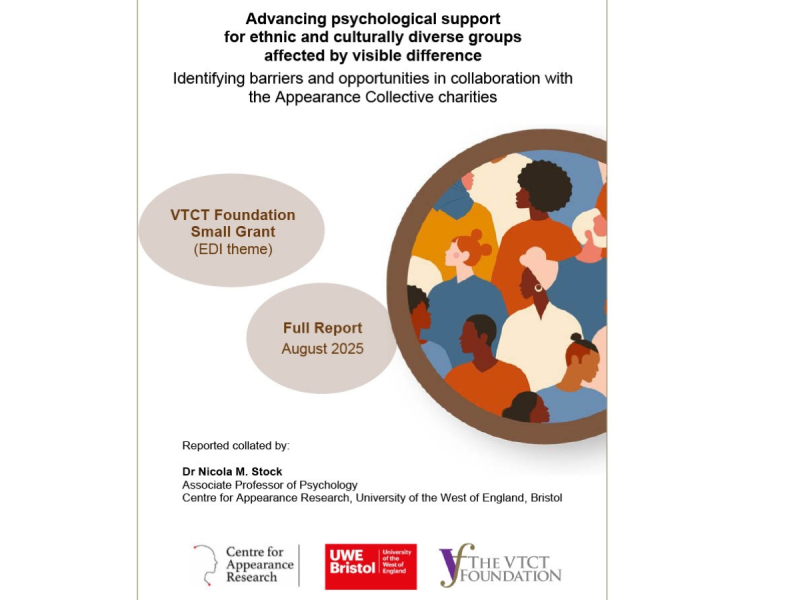
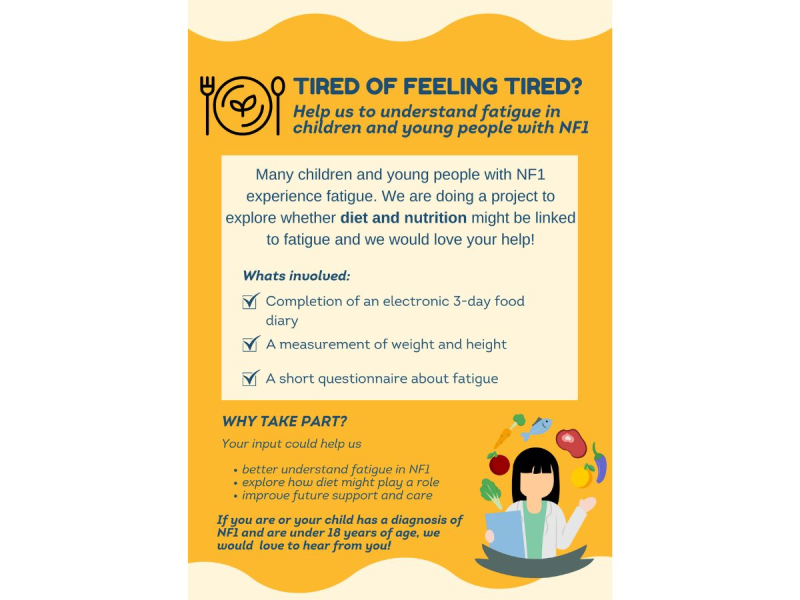
_800_600_s_c1.jpg)

.png)


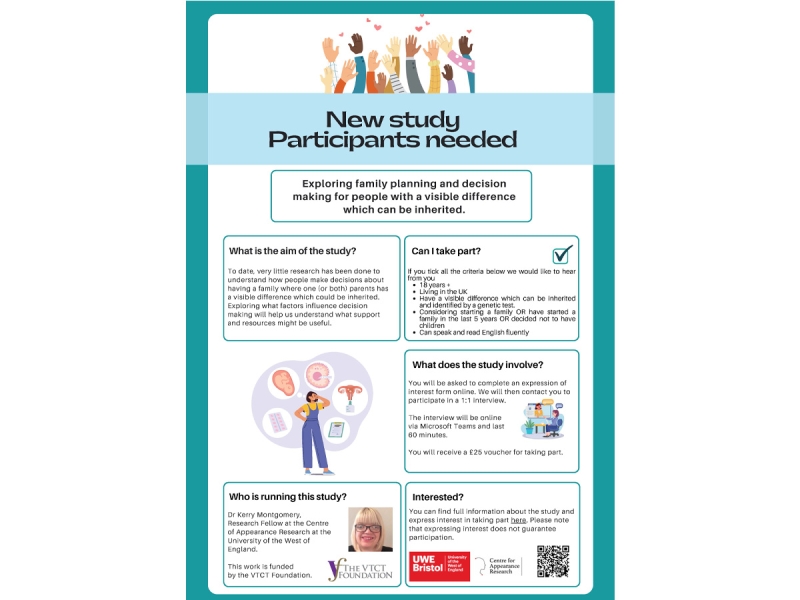
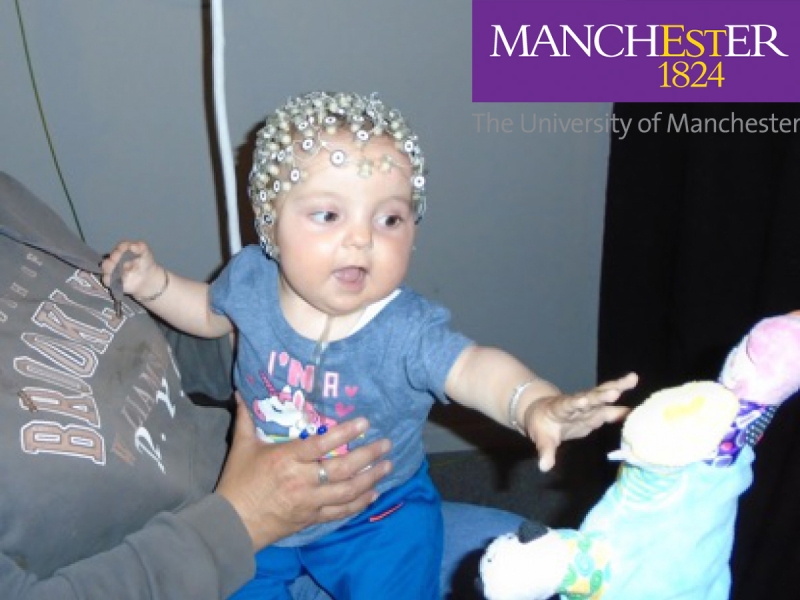
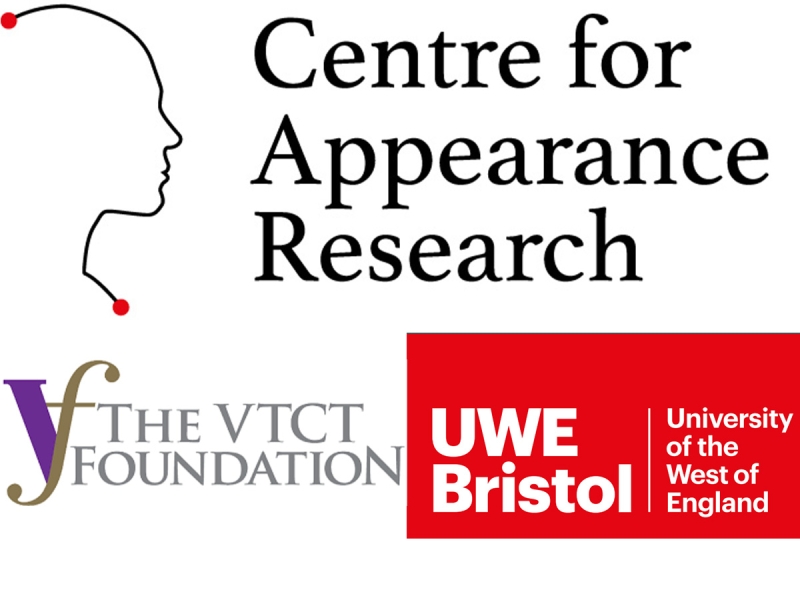
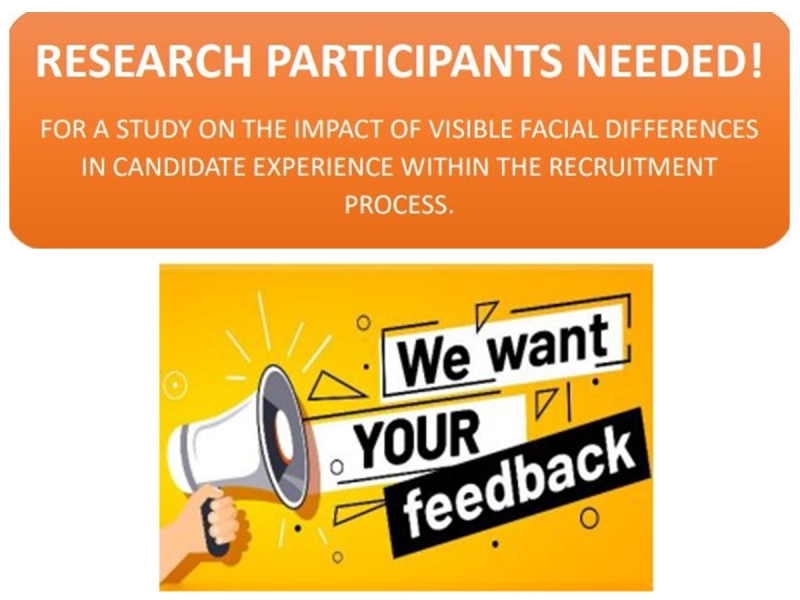
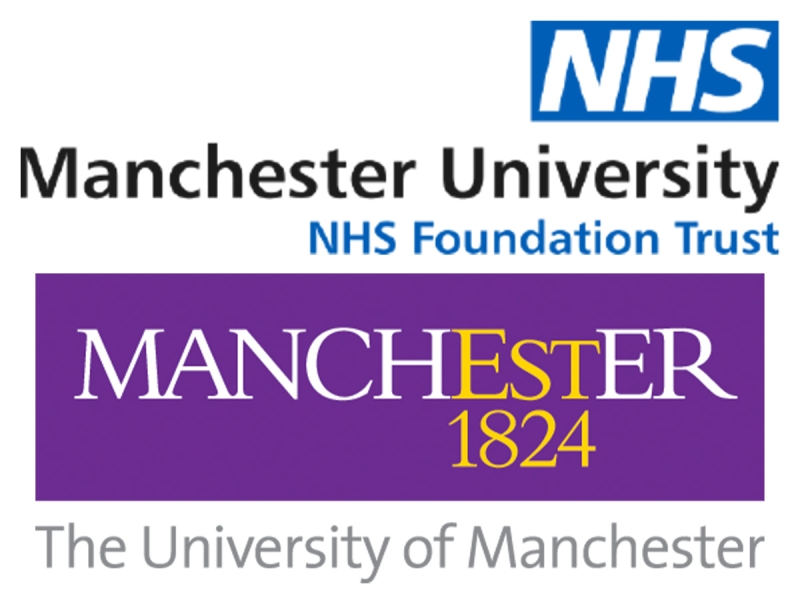
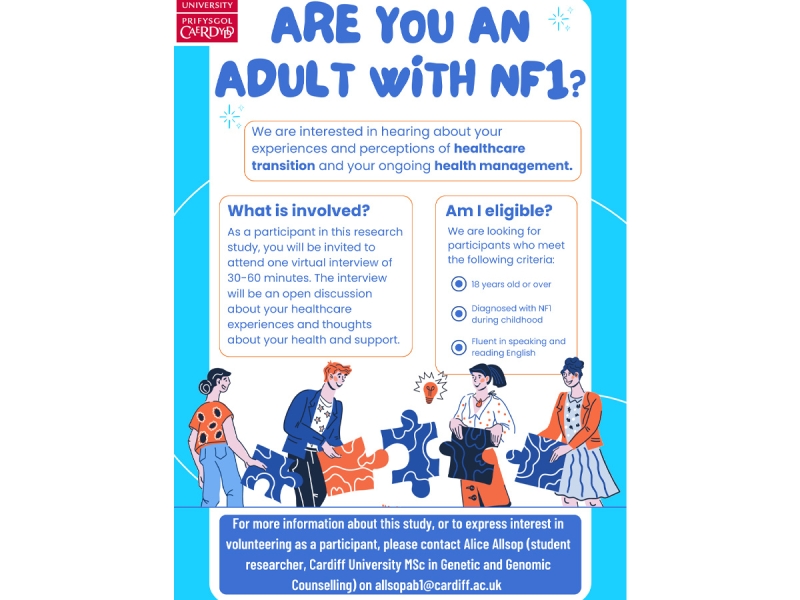
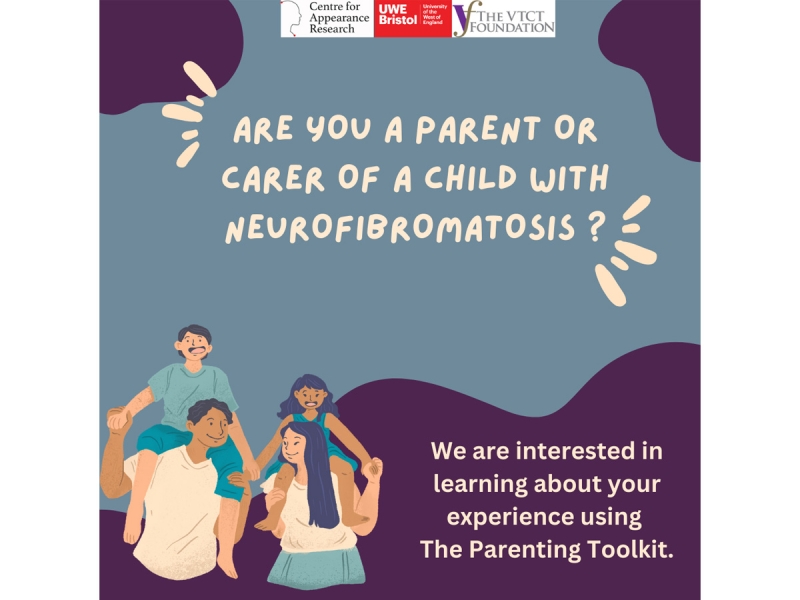
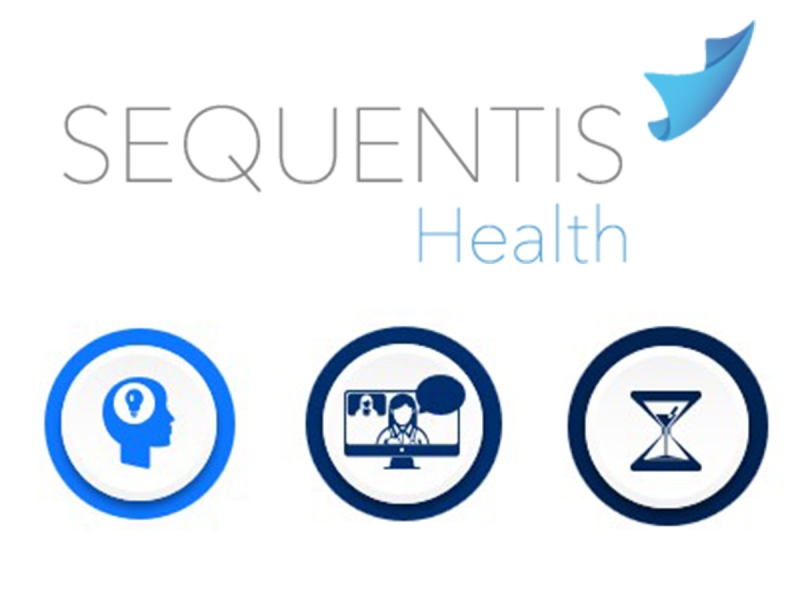
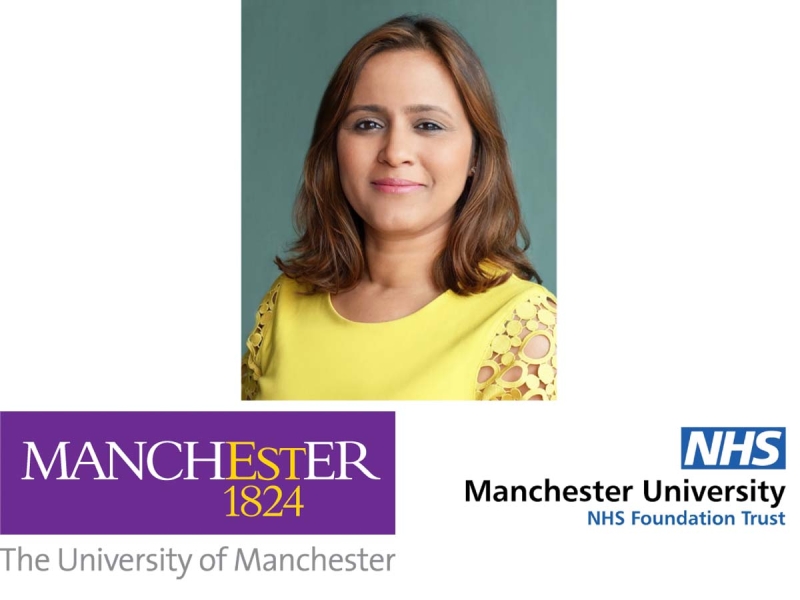
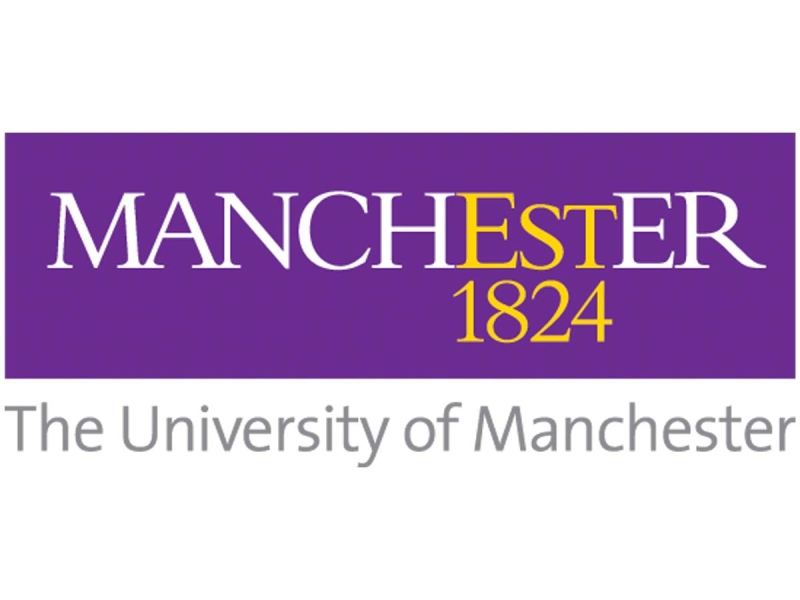
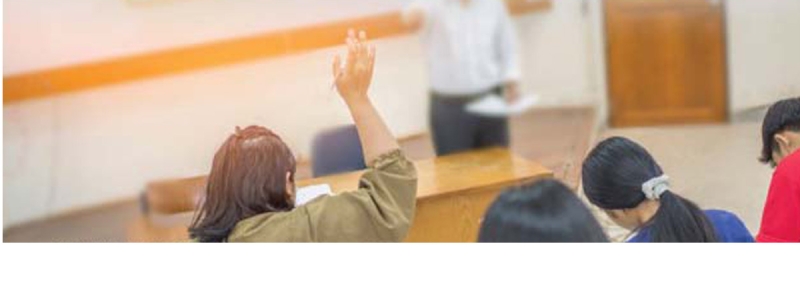
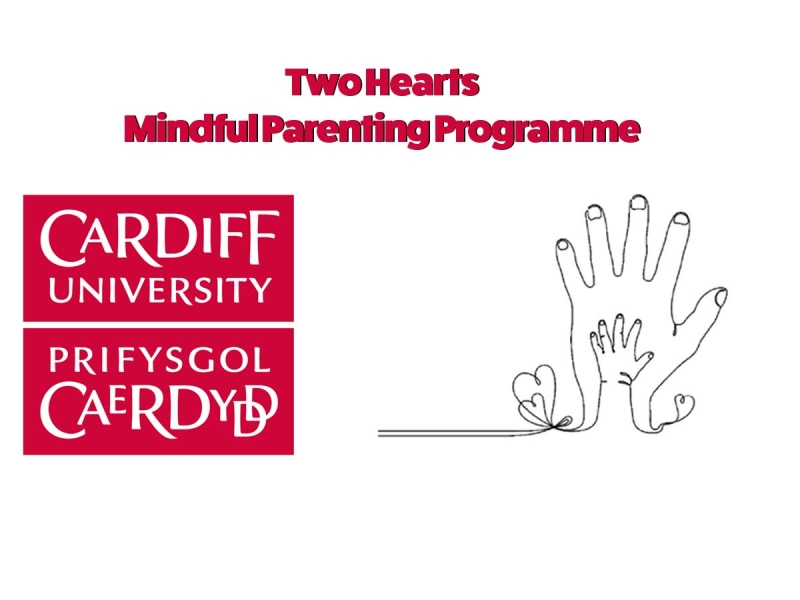
_1200x900_800_600_s_c1.jpg)
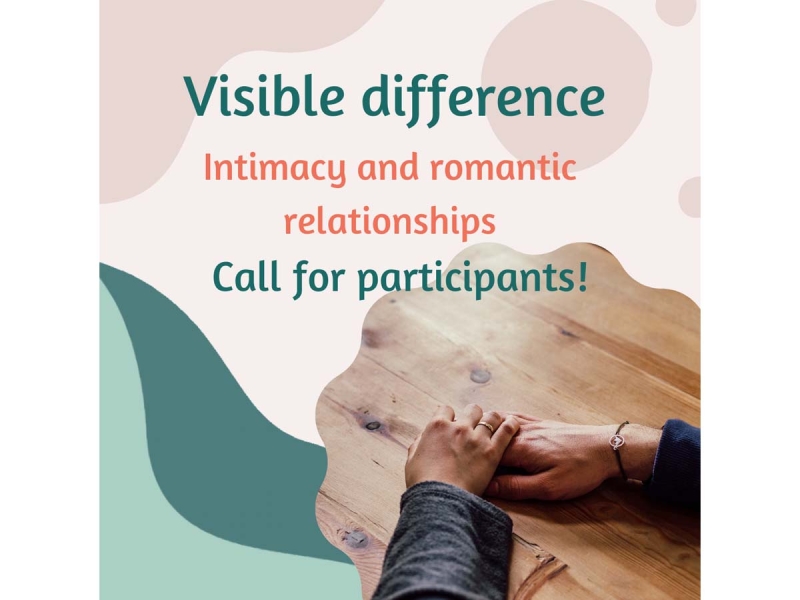
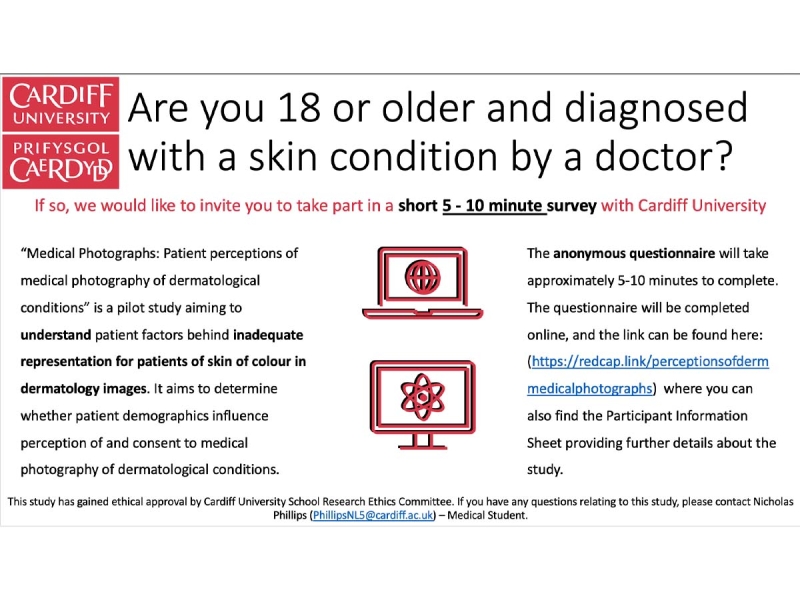
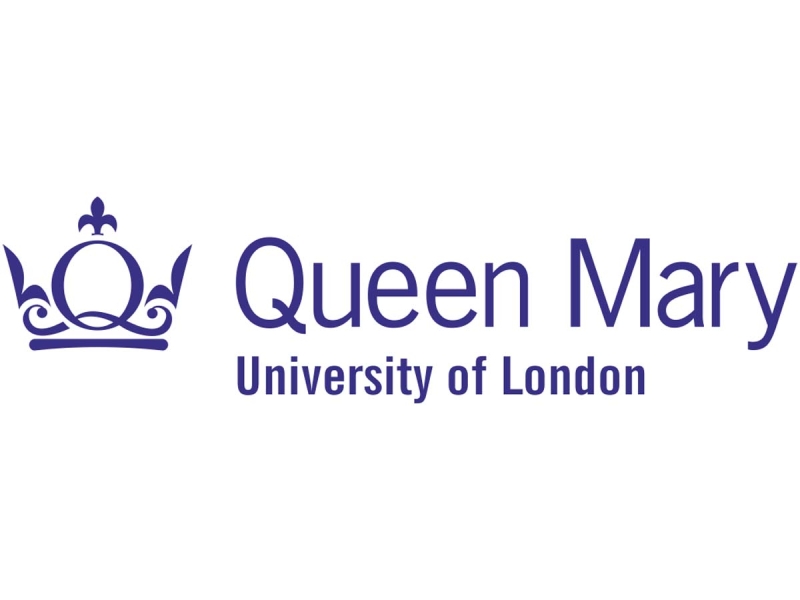
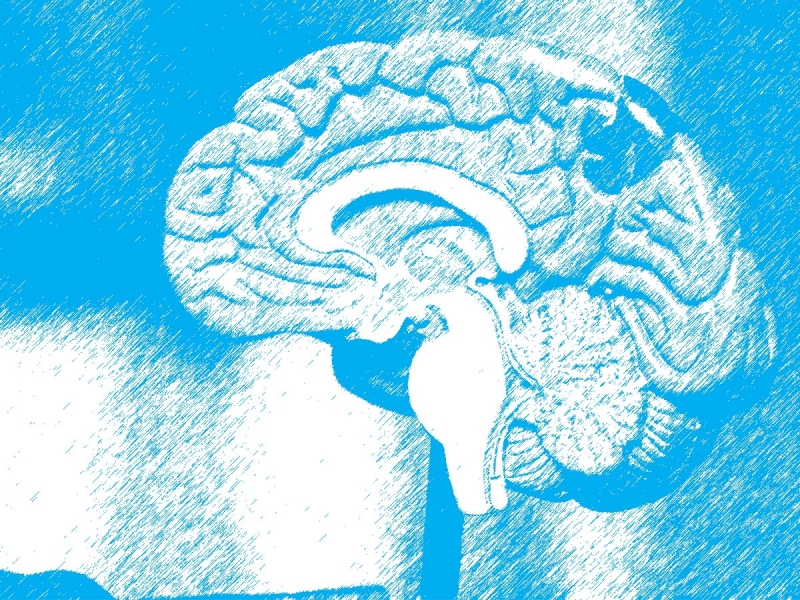
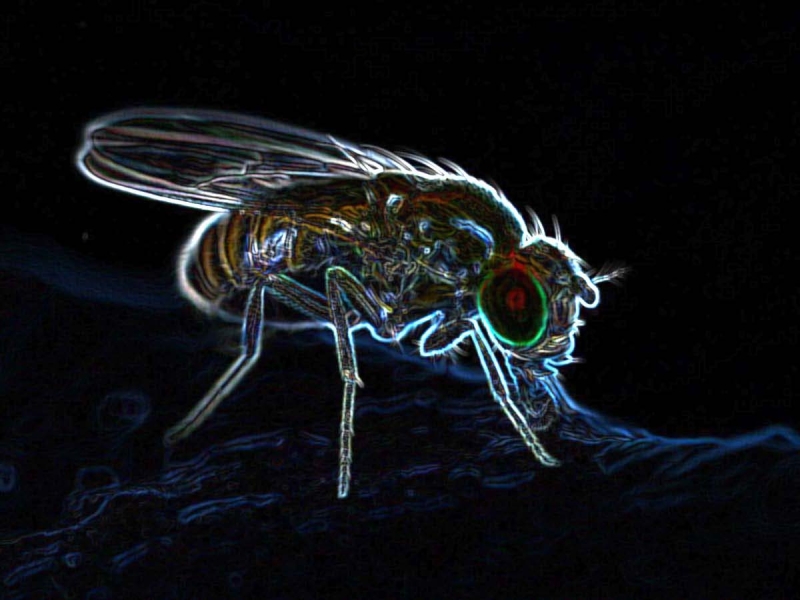
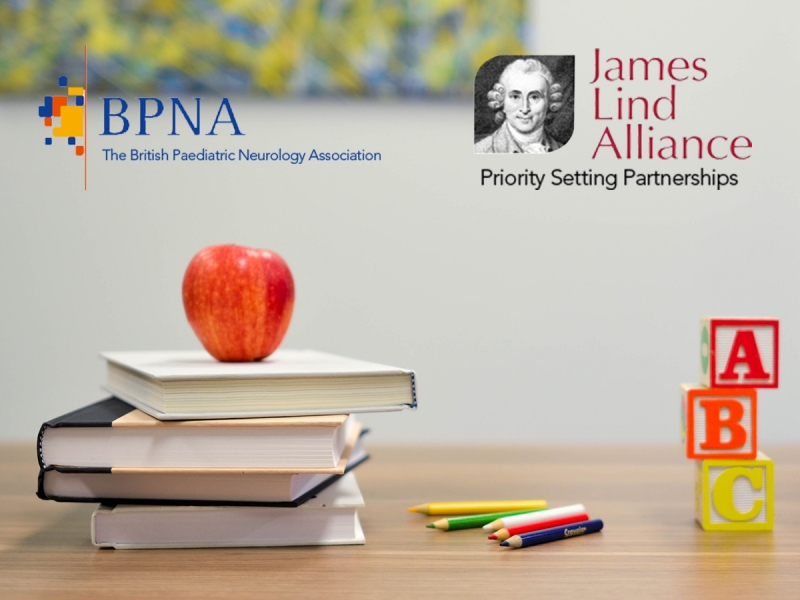
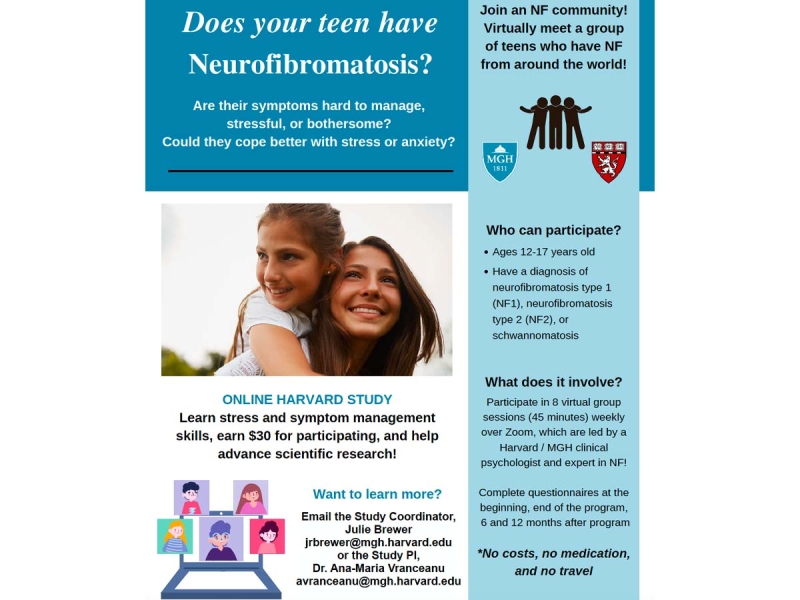
_800_600_s_c1.png)
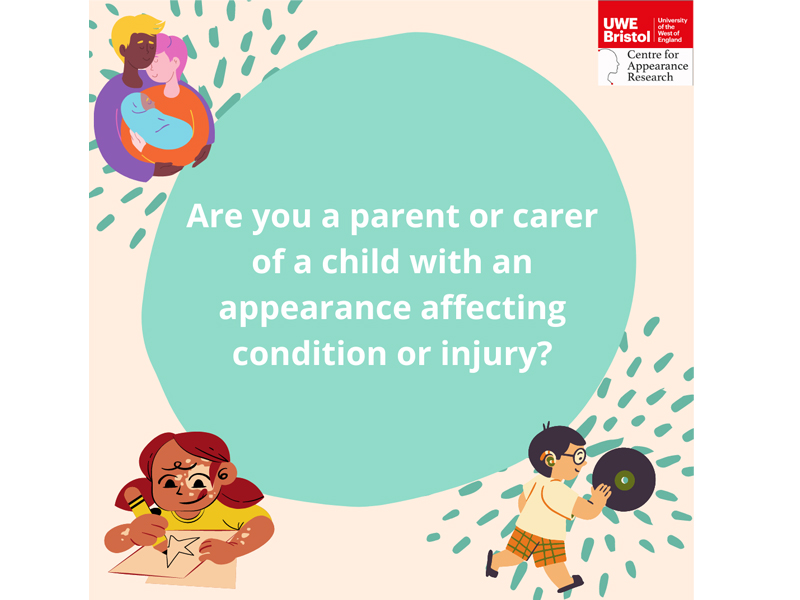
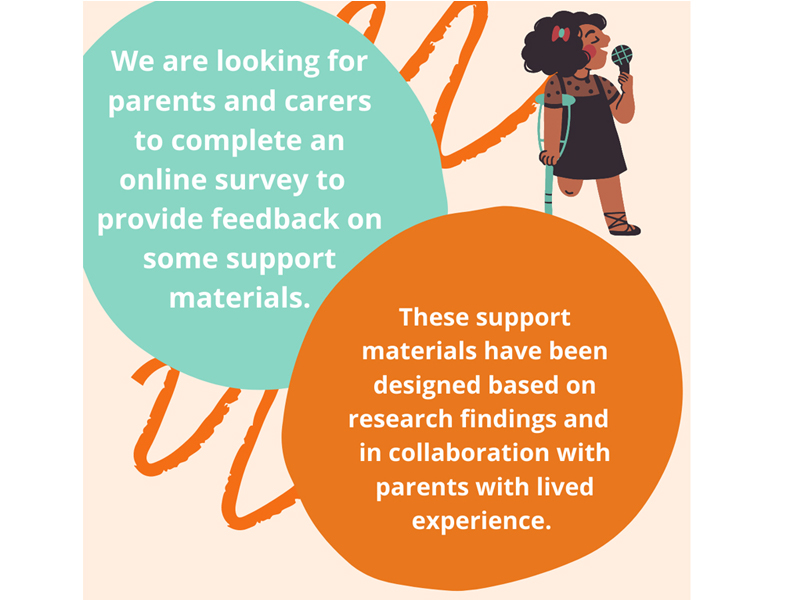

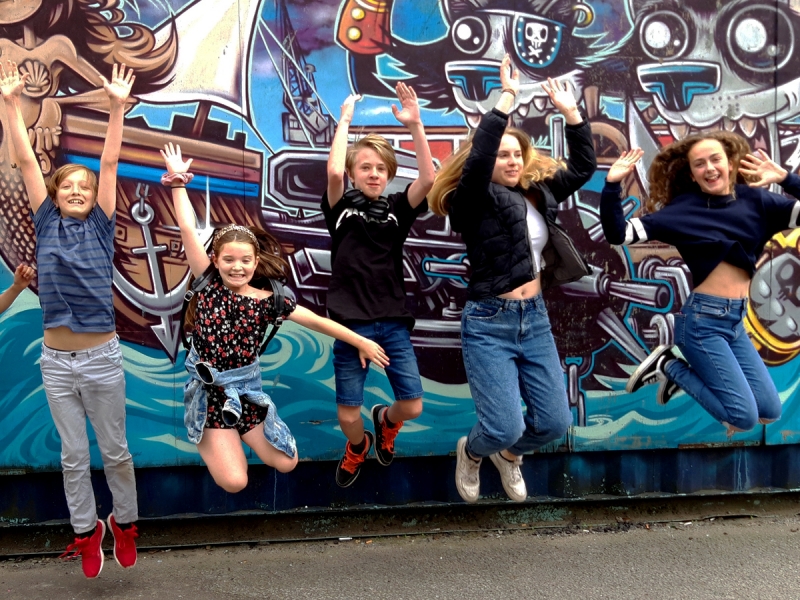
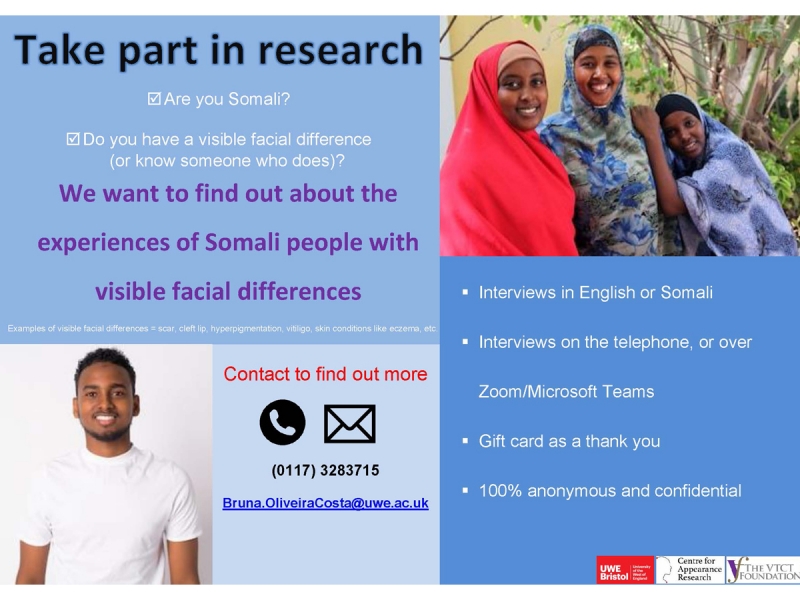

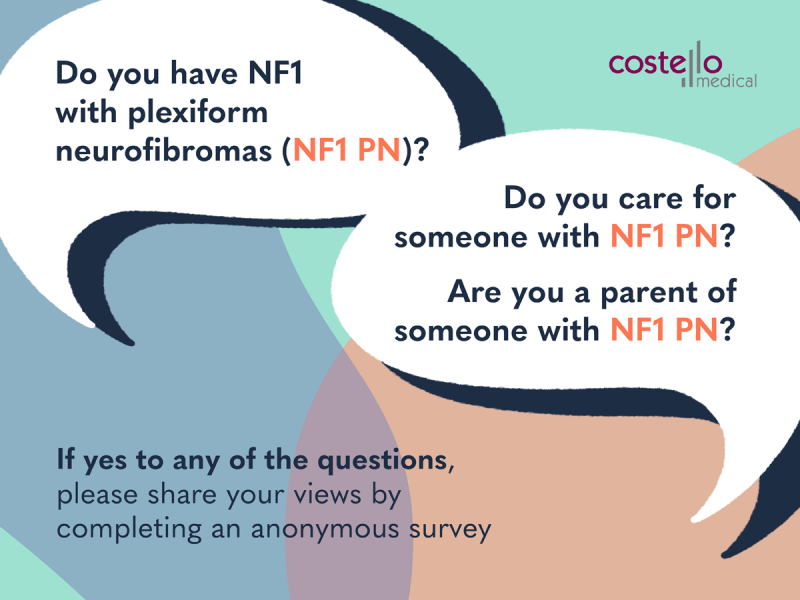
_1200z900_800_600_s_c1.jpg)
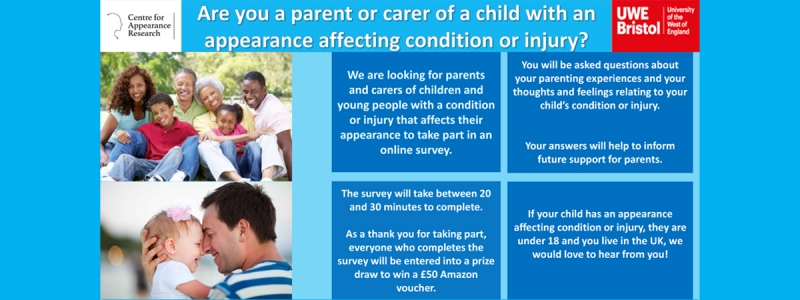
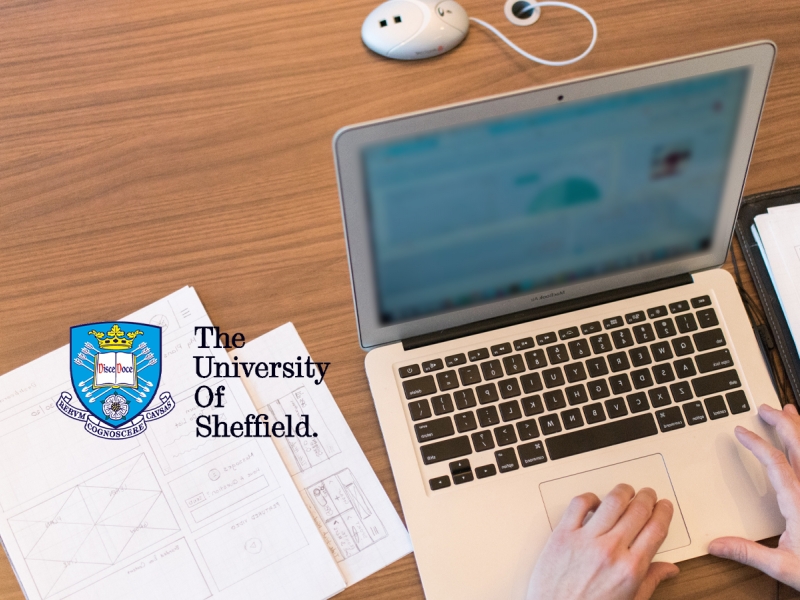
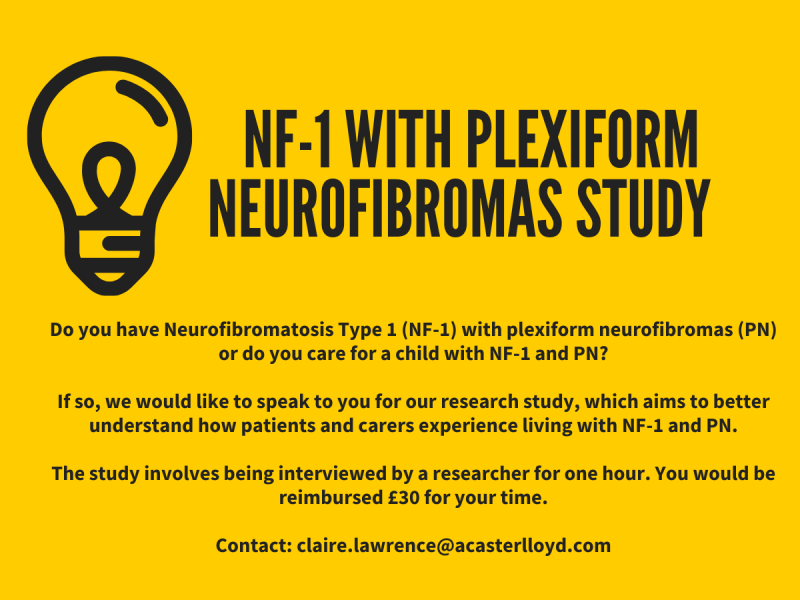

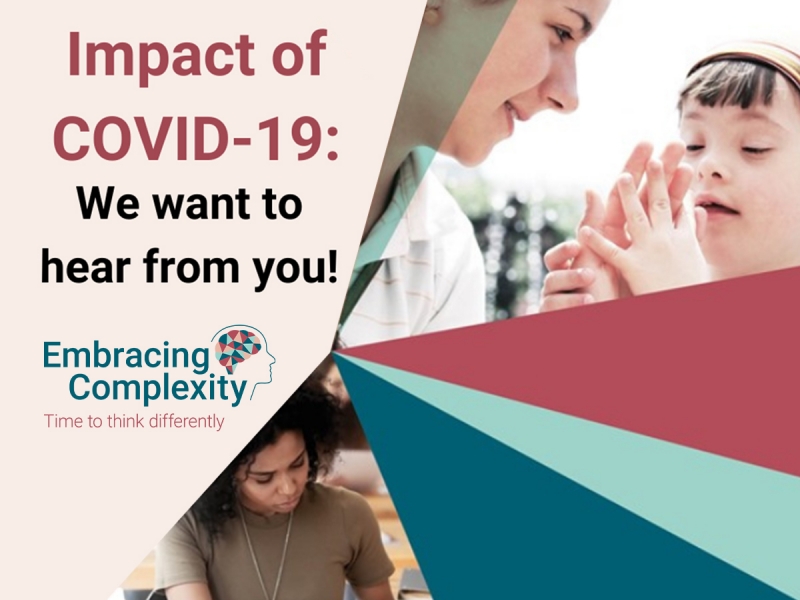
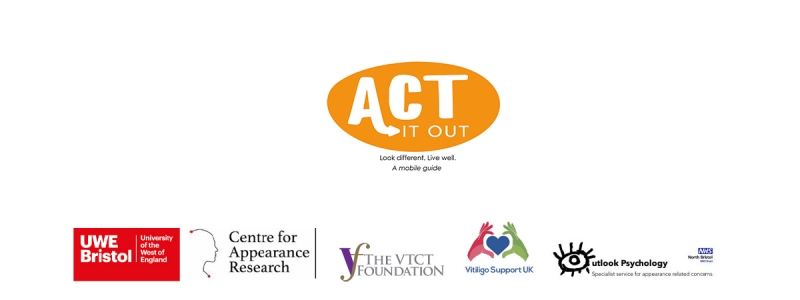
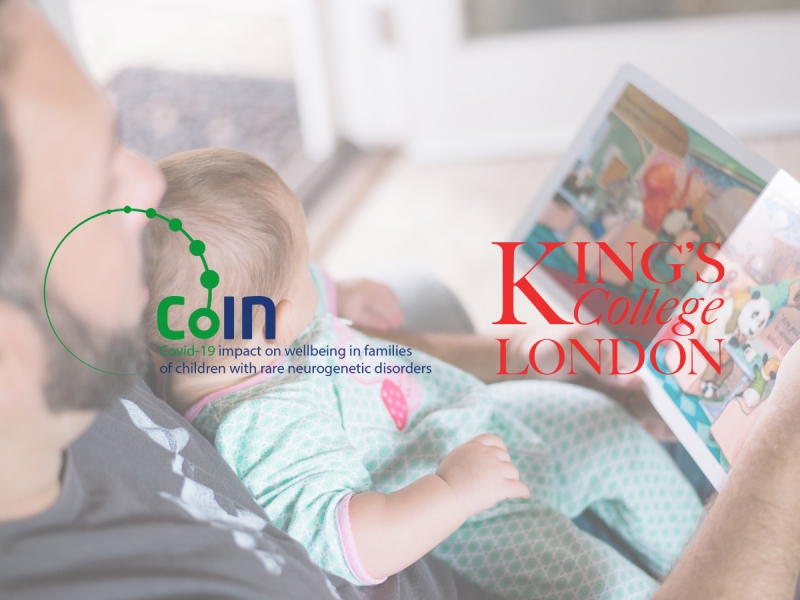


_6_500_375_s_c1.jpg)

